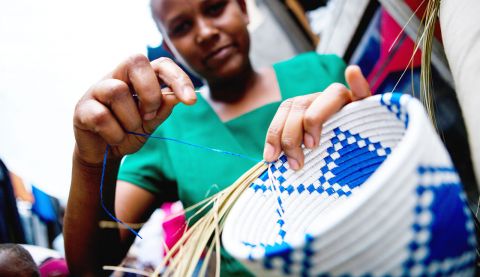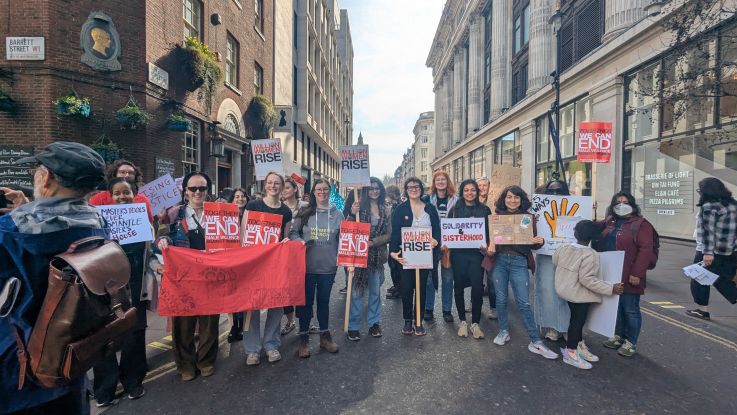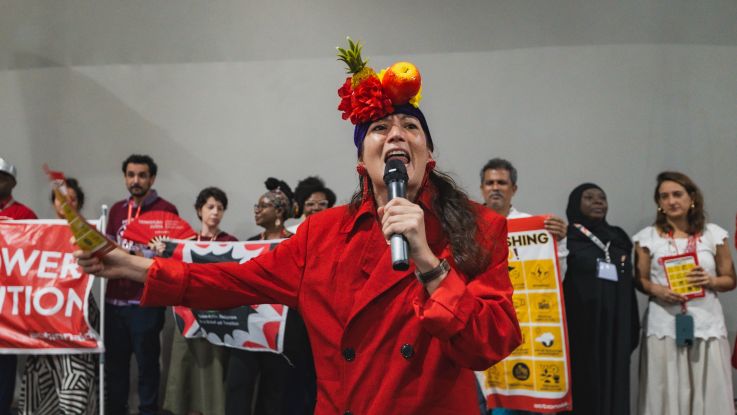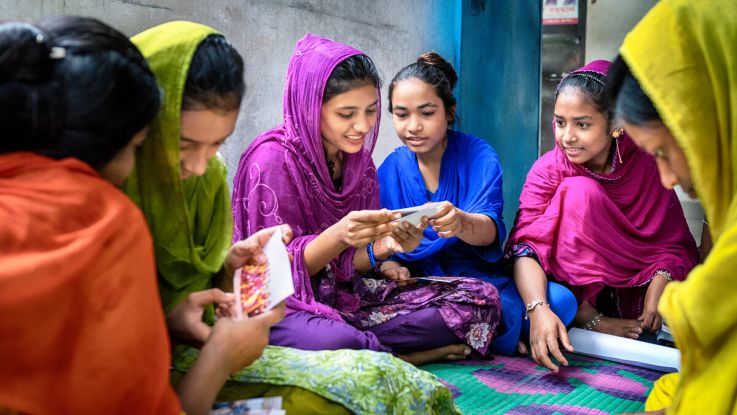Violence in the workplace: women demand change
9 December 2021
Content warning: violence against women.
Find out how violence affects women in the workplace around the world, and how vital it is that the International Labour Organisation's Convention 190 is ratified by governments worldwide, immediately.

In Uganda Cossy, a survivor of violence, now works as a basket weaver, and does outreach in her community to support other survivors. Photo: Karin Schermbrucker/ActionAid
For the last 30 years, the 16 Days of Activism to end violence against women and girls (25 November – 10 December) have provided an important opportunity to shine a spotlight on the urgent need to stop one of the most insidious human rights abuses.
Globally, the prevalence of violence against women and girls is unacceptable - affecting every aspect of women and girls’ lives.
While most acts of violence are perpetrated by someone known to them, such as an intimate partner, women and girls face the possibility of violence anywhere. It is therefore unsurprising that gender-based violence and harassment disproportionately affect women at work.
It is pervasive in all jobs and sectors of employment; and tragically, remains largely under-addressed in national laws and policies.
In June 2019, however, after over a decade of tireless campaigning and advocacy by feminist and labour rights activists, the International Labour Organisation (ILO) adopted Convention 190 (C190), along with Recommendation 206 (R206),1 the first international binding treaty to address gender-based violence and harassment in the world of work.
This is a major breakthrough and a chance for governments and employers to show they are serious about breaking the cycle of abuse.
To mark the 16 Days, ActionAid UK and CARE International UK co-hosted a webinar to hear directly from those on the frontline about the ratification and implementation process.
Maya Oppenheim, Women’s Correspondent at The Independent spoke to Labour MP Kate Osamor, CARE International Ecuador’s Country Director Alexandra Moncada, FIDA Ghana’s Executive Director Susan Aryeetey and Margaret Brew-Ward, Women’s Rights Policy Adviser at ActionAid Ghana. You can watch a recording of the discussion. (Zoom link, passcode 0VMrCq+s).
How violence impacts women at work
Figures show that levels of reported gender-based violence in the workplace vary, depending on the context, between 40 and 50%.
This is corroborated by a recent Fawcett Society report2 which showed that in the UK, at least 40% of women have experienced sexual harassment at work.
While sexual harassment is the most common form of violence, reported abuses are far more wide-ranging - from bullying by managers and supervisors, body searches and forced pregnancy tests to dismissal of pregnant women, violations of sexual and reproductive health and rights, threats and beatings when women dare to challenge oppressors.
What’s more, the impact of domestic violence often spills over into the workplace.
Evidence shows that women who experience domestic violence or intimate partner violence are employed in higher numbers in casual and part-time work, and their earnings are up to 60% lower compared to women who do not experience such violence.
Women in the informal sector are even more at risk
Whilst women in both formal and informal employment are exposed to the threat and experiences of violence, ILO research shows that in the Global South casual workers and informal sector workers – women working alone, outside normal working hours or interacting with people - face particularly high risks of violence and harassment.
Alexandra Moncado, CARE International Ecuador, described the dire reality of workers in Ecuador where around 50% work in the informal sector without contracts or social security – that includes at least 60% of women.
So, in a country where 70% of women face violence or harassment, it’s not hard to do the maths. A recent report from ActionAid Ghana highlighted the pervasiveness of violence experienced by women domestic workers and women who work in bars and restaurants.3
80% of the workforce [is] employed in [the] informal economy. The majority are women and almost 50% had experienced sexual harassment, and 60% didn’t report because of the number of barriers in accessing the justice system."
Margaret Bew-Ward, Action Aid Ghana
Violence in the workplace: the fear of speaking out
Many women do not report incidents, let alone seek redress because they fear sanctions and negative repercussions for speaking out.
In Kenya, 95% of women who had suffered workplace sexual abuse were afraid to report the problem for fear of losing their jobs, because those women who did report were either fired or demoted.
While in Jordan, one in five women experienced one or more forms of violence in the workplace, and out of those women a third kept silent about the violence and harassment they experienced.4
[It is not surprising that] women in Ghana are not coming forward to report their experiences - sexual harassment is not criminalised. I hope that ratification will help change that."
Susan Aryeetey, FIDA Ghana
Change is on the horizon – for all workers
International treaties can seem distant from our daily reality, but C190 really has the potential to transform lives.
It provides a clear and practical framework to act against violence and harassment in the world of work and it also reinforces existing commitments to end all forms of violence against women and girls.
In addition, it challenges the harmful norms that underpin this violence, ensuring justice for women by holding perpetrators to account.
C190 is wide in scope in that it protects all workers – whether for current employees, job applicants or volunteers. It covers the public and private sectors, as well as the formal and informal economy. It recognises the world of work as extending beyond the physical premises to include travel as well as commuting to and from work.
It requires also countries to adopt laws and policies to prohibit violence and harassment at work – but goes further in that it seeks to prevent it.
Importantly, in a ground-breaking move, C190 recognises the impact that domestic violence may have in the world of work.
It acknowledges that violence against women and girls does not happen in a vacuum, and that gender-based violence at work is part of a continuum of violence against women and girls, that is perpetrated in intimate relations, in homes, on transport, in public and digital spaces.
What we need now, is for governments and employers to ratify and fully implement it – and it is our role as civil society to continue pushing.
We are committed to campaign for change!"
Margaret Bew-Ward, Action Aid Ghana
Ending violence against women and girls is possible
There is substantial evidence that feminist and women’s rights organisations and movements have long been at the forefront of pushing for change, effective implementation therefore requires mechanisms and structures that promote and support women’s collective voice.
The most important and consistent factor in driving policy change is feminist movement."
Alexandra Moncado, CARE International Ecuador
So far only a handful of countries have ratified: Argentina, Namibia, Somalia, Ecuador, Mauritius, Greece, Italy, Uruguay and Fiji – but the list is growing and over 20 governments are in the process of ratification, with France and the UK the latest to have nearly finished the process. Spain, South Africa, Mexico and Germany are next.
We know progress will not happen overnight, but change is happening.
Most people have understood that this is a serious violation and that it needs to be addressed."
Susan Aryeetey, FIDA Ghana
Civil society organisations working to end violence against women and girls will not rest until all C190 is ratified and implemented everywhere and until every woman and every girl, wherever she is, finally lives a life free of violence and harassment.
We must never rest on our laurels.
We need to continue working together to promote the implementation of this agenda – in the UK and across the globe."
Kate Osamor MP
Help us to take action
If you agree that ending violence against women is possible, and that all governments should ratify the C190 treaty now – please share this blog on social media.
Footnotes
- 1https://www.ilo.org/wcmsp5/groups/public/---dgreports/---dcomm/---publ/documents/publication/wcms_721160.pdf
- 2https://www.fawcettsociety.org.uk/Handlers/Download.ashx?IDMF=8eabc7f1-07c0-4d7e-9206-de431524301e
- 3https://www.actionaid.org.uk/sites/default/files/falling_through_the_cracks.pdf
- 4https://www.actionaid.org.uk/sites/default/files/the_justice_deficit_for_women_in_jordan.pdf



